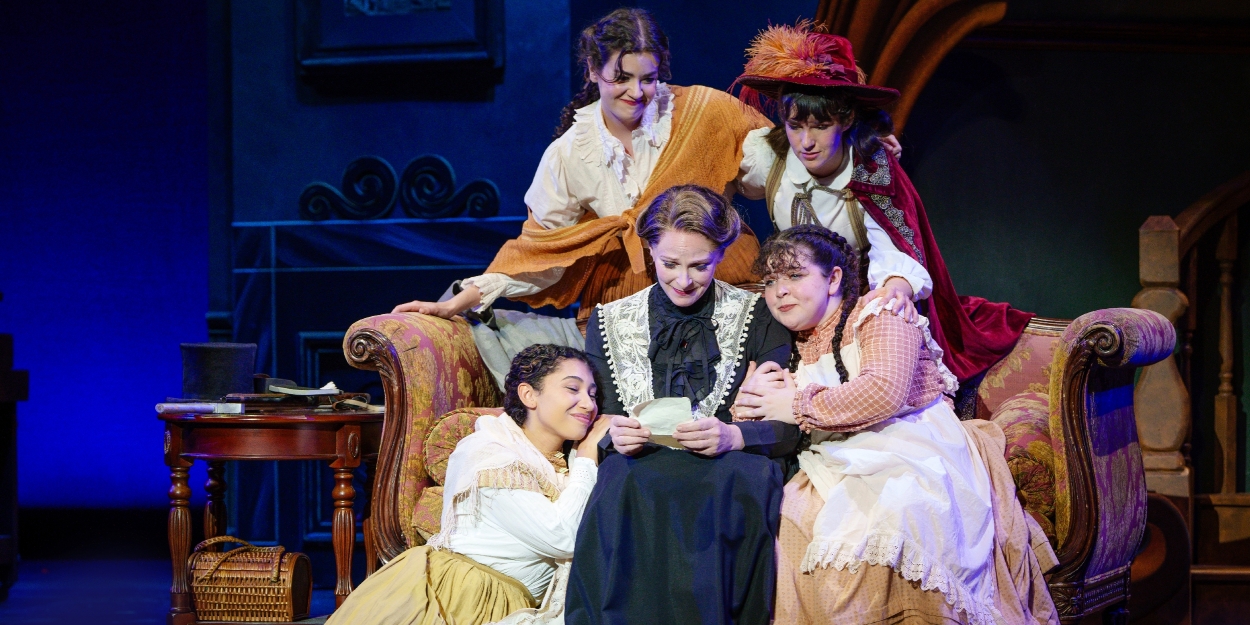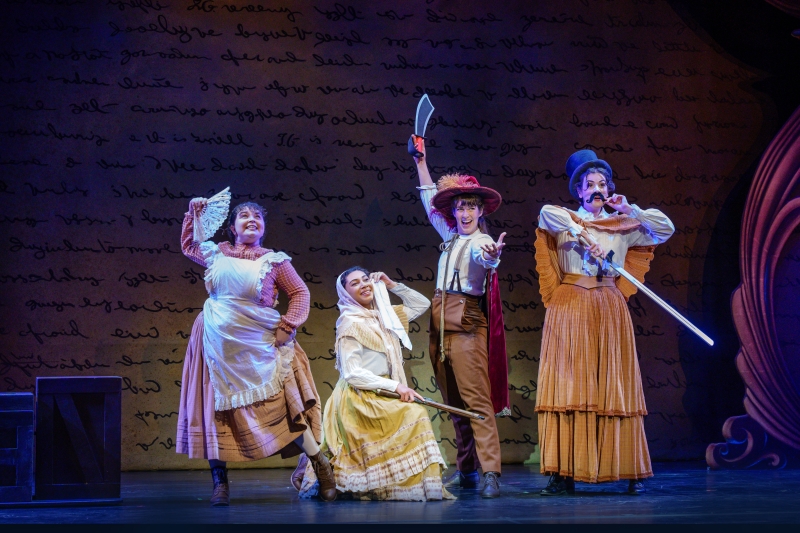Review: LITTLE WOMEN at Capital One Hall
Runs through Sunday, May 19th

Christopher Columbus.
Jo March’s preferred exclamation may feel a bit overused in the musical adaptation of Little Women, but it’s also apropos.
The problem with adapting a beloved classic is that beloved classics often already come in many other forms – Little Women has appeared not only in its original novel form, but also as films, television series, radio productions, stage plays, reinterpreted novels and novellas, and even a web series. The question, though, when a new version arises, is what does it add to our experience and interpretation of the work? What does it tell us about the story, the characters, or ourselves? When it comes to the musical adaptation, it may take the infamous explorer’s help to discover that.
Okay, that may be a bit harsh, but it’s also fair to try to understand what value the musical adaptation of Louisa May Alcott’s famed semi-autobiographical tale adds to the zeitgeist, both as an initial show and as a current touring production. The musical, written by Allan Knee, with music by Jason Howland and lyrics by Mindi Dickstein, ran on Broadway for less than six months in 2005, likely in part due to its rough pacing and failure to really capture the essence of what has made Alcott’s novel so beloved. The musical doesn’t quite seem to know what story it wants to tell, and the result is a show that manages to both race through the plot and drag, layering unremarkable song after song without really advancing the story. It also loses sight of the story’s heart – what makes the novel so enduring is the characters and the relationships each of the sisters share with each other and as a group. Unfortunately, with much of the sisters’ interactions confined to an overstuffed first act, their individual personalities and interactions are lost. Save for a few introductory lines at the top of the show, the audience barely gets to know Jo’s sisters, seeing them only in service of hitting specific plot points: Amy burning Jo’s manuscript, Meg meeting Mr. Brooke at the ball, Beth playing piano with Mr. Lawrence. With each sister reduced to a throwaway line and a single scene, it’s hard to really become invested in them, or understand how much they mean to Jo – except for how often the audience is told they’re important. Weirdly, it’s the men who are given more time to shine, starting with the opening of the show and Jo’s introduction being presented through the eyes of Professor Bhaer, which genuinely feels like an odd choice for a story obstinately about a woman and her sisters. By Act II, it’s hard not to notice that far more attention has been put into showing the development of Jo’s relationship with the Professor than has been paid to any of her sisters, who almost feel like an afterthought in the second act except for one touching scene between Jo and Beth before Beth’s passing. In fact, it starts to feel like the purpose of the musical may be more to tell the sisters’ love stories than to tell the story of their love for each other.

All of this sets an ominous stage for the national tour of Little Women, which is currently playing at Capital One Hall. Unfortunately, it doesn’t feel like the creative team really has any sense of why this show at this time, and the production choices for this tour do little to save it from its lackluster material. Despite the casts’ best efforts – particularly from Aaron Bower, as Marmee, and Hannah Taylor, whose Jo makes a valiant effort to carry the entire show into the realm of entertaining – the touring production is clunky and often feels underprepared. The sound went out on a few cast members’ microphones, causing them to need to adapt and project further than they normally would, and the costumes often looked unfitted, particularly around the waist, or too short, especially for the time period portrayed. Unfortunately, Jeffrey B. Moss’ directorial decisions also did the cast a huge disservice – their movements and pronouncements often felt far too large and enthusiastic for the material, often feeling like a children’s production, and the sisters in particular seemed to have been directed to lean into more nasal tones to appear younger; when the characters aged in Act II, their vocals became sharper and more natural, allowing the actresses’ underutilized talents to show more clearly. This was especially true for Taylor, whose delivery of “Astonishing” felt as though it was taken from a different production entirely and was much more suited to showing off her impressive range. Thankfully, there are some production elements that help bolster the experience. Randel Wright’s gorgeous set design features a combination of physical pieces, versatile screens, and projections, and is beautifully highlighted by Charlie Morrison’s solid lighting. The decision to have the characters in Jo’s stories serve as the ensemble and act out her tales as she shares them was also a clever touch, especially since the ensemble members subtly stayed in character even during scene transitions.
While those who are already fans of the musical may enjoy the production, there’s unfortunately little about the current tour of Little Women that will bring this show new audiences. The tagline may be “own your story,” but, sadly, this musical falls far short of telling this one well.
Little Women plays at the Capital One Arena through Sunday, May 19th. Tickets may be purchased through Ticketmaster, and information on the venue (including accessibility, parking fees, and restricted items) can be found on Ticketmaster and the Capital One Hall website. Performance run time is approximately 2 hours and 20 minutes, with one intermission.
Photos courtesy of Josh Murphy, of Chosen Creations. Banner photo features Camryn Hamm, Rachel Pantazis, Hannah Taylor, Noa Harris, and Aaron Bower (center).
Comments
Videos

